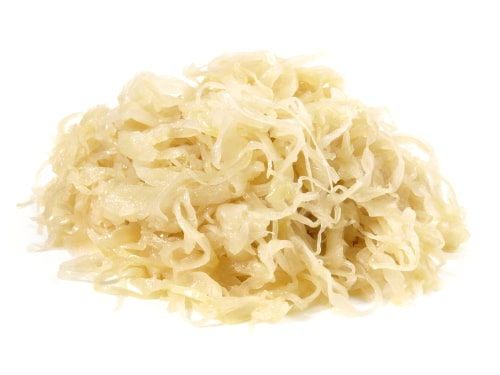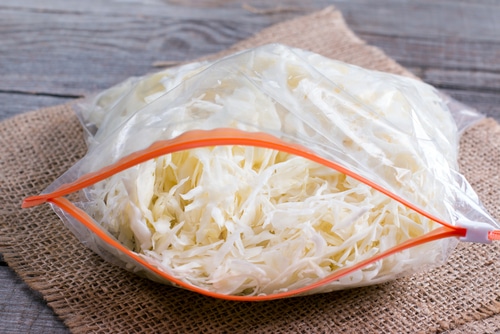Sauerkraut is a delightfully distinctive side dish or condiment you can use for various foods and recipes. Even though it has an obscure German name, the dish is no more than fermented cabbage shreds.
While it’s most commonly used minimally, you may still find the need to store sauerkraut for later use. If you have sauerkraut and don’t plan on using it for some time, you might want to freeze it just as you would other foods.
You might ask yourself, “can you freeze sauerkraut?” To answer your question and then some, we’ve compiled a complete guide with everything you need to know about freezing sauerkraut. Keep reading to learn more.
Can You Freeze Sauerkraut?

Yes, you can freeze sauerkraut. Freezing sauerkraut isn’t something that frequently happens to people as it doesn’t typically come in large batches. However, some things happen that lead to making more than you originally planned for, or you bought too much. In these cases, you can easily freeze your sauerkraut for later use.
How to Freeze Sauerkraut

Whether you’ve made your sauerkraut from scratch at home or you’ve purchased more than you need from the store, you should freeze it as soon as possible to ensure its longevity. Of course, sauerkraut will last in the fridge for a few days before it spoils. However, if you choose to freeze your sauerkraut, you might want to consider following these steps for the best results:
Transfer to the Correct Container
After making, or purchasing, your sauerkraut and using what you need, you can transfer the condiment to an air-tight container that can withstand a freezer’s temperature conditions. Even if you bought premade sauerkraut, you’ll still want to follow this step as the container it came in may not be freezer-safe.
Once you scoop it all into the freezer-safe container, you should seal the lid tightly and apply a label with the date. This way, you can gauge how long it stays in the freezer and better determine how long it will last.
You can also transfer the sauerkraut into multiple containers if you plan on using some, but not all, sooner in the future rather than later. When using multiple containers, you still want to make sure you use something freezer-safe even if you plan to take one out a week later as these container types will maintain the flavor and consistency best.
If You Have Cooked Sauerkraut
Freezing cooked sauerkraut follows the same process as raw sauerkraut and is probably the best course of action because it’ll be easier to defrost and use. To freeze cooked sauerkraut, you’ll need to transfer it to a freezer-safe container with an airtight lid, or multiple containers as you see fit. Then apply the label and store.
Related Article: Can You Freeze Lettuce?
How Long Will Sauerkraut Last in the Fridge/Freezer?
No matter your storage method, either in the pantry, fridge, or freezer, sauerkraut lasts for a few months at a minimum, however, refrigerating or freezing the fermented cabbage will extend its lifespan far past its pantry shelf life.
Since sauerkraut is a fermented product, leaving it out in the open on your counter or pantry, even with a lid secured tightly, will speed up the fermenting process. Speeding up the fermentation process will cause the sauerkraut to spoil sooner rather than later, which is why most people prefer to store the food in the fridge or freezer.
Storing sauerkraut in either the fridge or freezer slows down the fermentation process because of the lower storage temperatures. Of course, when choosing between the two storage methods, freezing will extend sauerkraut’s lifespan even longer than the fridge because it nearly stops fermentation.
That said, fresh or store-bought refrigerated sauerkraut can last in the fridge for over a year as long as it remains submerged in the brine. You can expect sauerkraut without brine to last for up to a week, or possibly a little over a week after opening, in the fridge.
The brine keeps the sauerkraut immersed in the fermenting bacteria and other necessities to keep the cabbage stable and good for longer. Without the brine, you will see much shorter lifespans.
For freezing sauerkraut, you can expect the longest lifespan. When frozen at zero degrees or slightly below, sauerkraut can last indefinitely. That said, you still want to check on it from time to time to make sure it’s still good.
The container you use to freeze the sauerkraut will also impact its lifespan. For instance, if you use a heavy-duty storage container with an air-tight lid, you can expect the sauerkraut to last longer than it would in a Ziploc bag or other similar container. This discrepancy in longevity is because the freezing temperature is less likely to permeate the bag and cause freezer burn.
How to Tell if Your Frozen Sauerkraut is Bad
Since sauerkraut is an already spicy, tart concoction that is unpasteurized and goes through a fermentation process, telling whether it’s gone bad or not can be difficult.
For example, when storing sauerkraut, you may notice some bubbling, a bulged lid, or some fizzing. These happenings don’t signify that the sauerkraut has gone bad but that the fermentation process is working as it should.
If you want to tell if your sauerkraut has spoiled and it isn’t submerged in brine, you can easily check the container for mold, unnatural or changed smell, dryness, or texture changes. You’ll notice these changes more quickly once you defrost the sauerkraut.
If you don’t want to take the time to defrost the cabbage, you can also look for signs of freezer burn. If you notice ice crystal accumulation on the cabbage, you can toss it as it’s most likely freezer burned and no longer edible.
Sauerkraut can last upwards of a year when frozen but anything past a year and a half, you might want to throw away because it most likely isn’t as good as it once was. The longer it remains in the freezer, the more likely it is to dry out too.
What to do With Frozen Sauerkraut
If you choose to freeze sauerkraut, you can sit back and relax until you need it to use it again since it has a long lifespan when frozen. When you need the sauerkraut again, you can either defrost it or use it as is when you dump it from the freezer container.
Defrosting
If your recipe requires you to defrost the sauerkraut, such as for condiment use, you should do so slowly just as you would for other frozen dishes. Defrosting the sauerkraut slowly will ensure it maintains its distinct flavor and freshness. If you try to speed up the process, you might alter the texture and flavor.
Defrosting sauerkraut can take up to 24 hours to complete. This time frame is something you might want to keep in mind if you need to use it immediately or prepare a dish that requires the cabbage.
If you need to speed up the process, do not submit the sauerkraut to heat. Instead, submerge the container in a bowl of cool water, much like you would do for chicken or other meats. In doing so, you speed up the process without compromising flavor.
Of course, things happen and you may need to use the sauerkraut immediately, in which case defrosting slowly won’t work. In this case, you can heat it in the microwave. However, you’ll want to let it heat for small batches rather than a single, long time frame if you don’t want to compromise its flavor, texture, or edibility.
If you don’t use the sauerkraut in its entirety after defrosting, it will keep for up to a week refrigerated.
Using Directly From the Freezer
Sometimes, you can skip the defrosting process altogether and dump the frozen sauerkraut directly into your dish. Typically, this use method occurs when a recipe calls for cooking the cabbage. Keep in mind, though, that the sauerkraut is frozen and will require a few extra minutes of cook time to thoroughly warm through.
If you don’t want to add time to the recipe in fear of ruining the other ingredients, you can always use the microwave or submerging option to thaw to sauerkraut some before adding it to your pan, pot, or what have you.
Conclusion
Can you freeze sauerkraut? In short, yes. Freezing sauerkraut is possible and rather effortless if you choose to store it that way.
However, you should consider what you need it for if you’ll need it shortly, and refrigeration storage as well. After all, sauerkraut, when stored in brine, has a particularly long shelf life when stored in the fridge too, and doesn’t require a defrosting process either.
Ultimately though, you can store sauerkraut just as easily as you would store anything else. Just remember to transfer it into a freezer-safe, air-tight container to ensure its longevity and freshness. Also, you’ll want to remember to date the container so you can gauge its shelf life accurately.







my recipe for sauerkraut salad includes green & red peppers, onions, celery, sugar and vinegar. can this mixture be frozen? i will be making a large batch and separating it into smaller portions. i plan to use quart freezer bags lying them flat, taking out the air and placing them in a gallon bag on top of one another after they are completely frozen. thank you for your help.
Hi Jacki, freezing your mixture should be fine, at least for several months. The main things to keep in mind are leaving some space in your bag or container to not have expansion cause any issues in the freezer. Also, make sure your mixture is not warm and fully cooled before freezing.